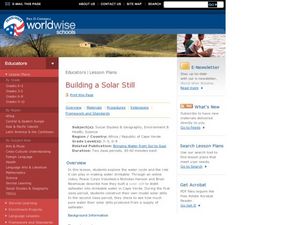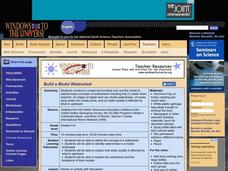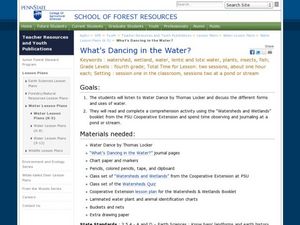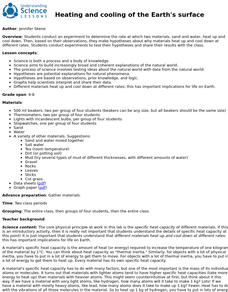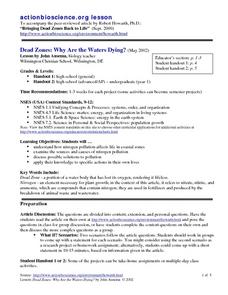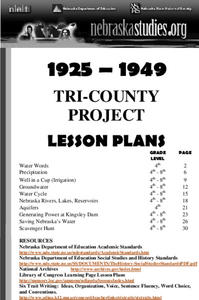Curated OER
The Water Cycle
In this water cycle worksheet, students learn about the 3 different stages of the water cycle: evaporation, condensation and precipitation. They then solve the 12 problems on the page. The answers are on the last page.
Curated OER
Digging the Earth's Crust
Students investigate the Earth's crust. In this geology lesson, students identify the materials made up of the Earth's crust and investigate the different kinds of soil.
Curated OER
Pollution Solutions: Earth Day
Eighth graders explore water pollution. In this stewardship instructional activity, 8th graders draw comparisons between potable and impaired waters. Students use the Learning Link website to examine ways people are fighting pollution...
Curated OER
Kids Conserve? Water Preserved
Sixth graders review the steps of the water cycle. Individually, they calculate the amount of water they use in a day and identify ways they can conserve. As a class, they discuss how conserving water today helps future generations and...
Curated OER
Water, Water Everywhere
Students study the location of Earth's water and study the water cycle using a terrarium. In this water study lesson plan, students study a model globe for the Earth and find Alaska. Students locate the bodies of water and study an...
Curated OER
Wet Water, Dry Land
Students observe and examine relationship between landforms and bodies of water, recognizing differences between them. Students then define island, peninsula, isthmus, archipelago, lake, bay, straight, system of lakes, and identify land...
Curated OER
Water Topics
In this science activity, learners focus on the role of water in the environment and its many uses. They answer questions in the multiple choice and short answer form.
Curated OER
Importance of Water
Students complete a KWL chart on what they comprehend about water. They complete a water activity determining how much usable water is available, and they determine the water usage in their households. Students take notes on water and...
Curated OER
Water Cycle (Grades 2-4)
Students demonstrate their understanding of the water cycle and how it effects the environment by graphically depicting and describing the water cycle.
Curated OER
Forces That Shape the Earth: Wind, Water and Erosion
For this forces of nature worksheet, students read a 2 page article on the forces of nature and answer 4 detailed comprehension questions about the forces of nature on Earth.
Scholastic
Study Jams! Tides
The tide will turn in your earth science or oceanography unit when viewers see this clip. They learn that tides are caused by the gravitational pull of our moon, and are even impacted by the gravity of the sun. High, low, neap, and...
Curated OER
Building A Solar Still
Students investigate the water cycle by viewing an online video. In this drinking water instructional activity, students create solar stills at their campus in order to purify water that is tainted. Students view a video on their...
Centers for Ocean Sciences
Ocean and Great Lakes Literacy: Principle 1
Is your current lesson plan for salt and freshwater literacy leaving you high and dry? If so, dive into part one of a seven-part series that explores the physical features of Earth's salt and freshwater sources. Junior hydrologists...
Curated OER
Kansas Ponds, Lakes & Reservoirs
Students compare the ponds, lakes, and reservoirs of Kansas. In this geography lesson, students use Google Earth to research the different ponds, lakes, and reservoirs in Kansas. Students will discover that many of the bodies of water...
Curated OER
Build a Model Watershed
Collaborative earth science groups create a working model of a watershed. Once it has been developed, you come along and introduce a change in land use, impacting the quality of water throughout their watershed. Model making is an...
Curated OER
Is the Hudson River Too Salty to Drink?
Learners explore reasons for varied salinity in bodies of water. In this geographical inquiry lesson, students use a variety of visual and written information including maps, data tables, and graphs, to form a hypothesis as to why the...
Curated OER
Water Is Cool!
Students study water as a non-renewable resource. In this water lesson, students examine sources of water, uses of water, and explain why it is important to take care of water sources for the common good. They research the water cycle...
Curated OER
The Water Cycle
Pupils develop a better understanding of the need to conserve our renewable resources. In this water cycle lesson students take notes, complete a guide sheet and illustrate the water cycle.
Curated OER
What's Dancing in the Water?
Students learn about watershed, as well as the different forms and uses of water. In this water forms lesson, students brainstorm water sources and uses. Students read the book Water Dance and discuss water examples. Students complete a...
Curated OER
Wondrous Water
Students explore the different properties of water. They experimenting with different activities, each one explaining a different property of water. Students read an article "Small, Ues, But Might: The Molecule Called Water." and then...
University of California
Heating and Cooling of the Earth's Surface
Scholars collect data from heating sand and water before forming testable hypotheses about why sand heats up faster. Afterward, they develop and run experiments to test their hypotheses.
Curated OER
Dead Zones: Why Are the Waters Dying?
Young scholars investigate the effects of pollution on marine ecosystems. They read and discuss an article, identify the effects of pollution on marine life, conduct research on local nutrient pollution, and conduct local water quality...
Michigan Sea Grant
Water Quality
Learners observe water samples and measure the samples' water quality. Students develop their own criteria for measuring water quality and test for temperature, acidity, oxygen levels, turbidity, conductance, sediment and hardness.
Curated OER
Water Words
Students define words relating to water and its use in Nebraska. They listen to the story, Snail Girl Brings Water, list the water words from the story, and create a class dictionary.













